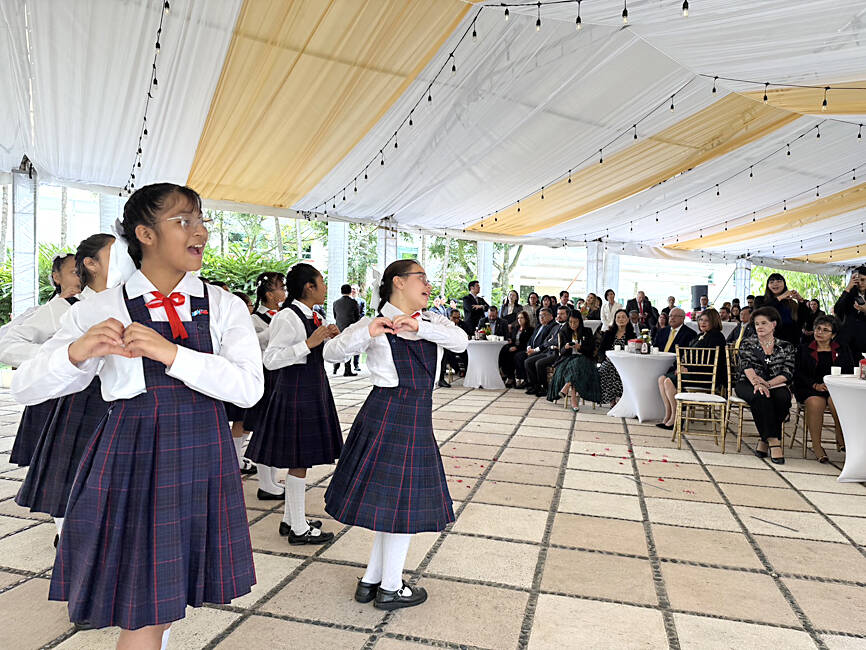Guatemala will continue its support for Taiwan through concrete action, Guatemalan Minister of Foreign Affairs Carlos Ramiro Martinez said on Wednesday at an event in Guatemala City to mark 90 years of diplomatic ties between the two countries.
Taiwan was represented by Ambassador to Guatemala Vivia Chang (張俊菲) at the event at the Guatemalan Ministry of Foreign Affairs.
The Republic of China (ROC) and Guatemala established diplomatic relations in 1934, with Taiwan establishing its first consulate general there in 1935, followed by a foreign legation in 1954 and an embassy in October 1960, Martinez said.

Photo: CNA
On Sept. 22, 2005, Taiwan and Guatemala signed a free-trade agreement, which took effect on July 1, 2006, he said.
The two countries signed a memorandum of understanding for technical cooperation on Oct. 31 last year, a basic Taiwan-Guatemala cooperation agreement in April last year and an agreement of mutual recognition in May 2021, Martinez said.
The agreements are the foundation for greater bilateral economic trade, provide opportunities for Guatemala’s exports and establish strategic partnerships across industries, he said.
Martinez thanked Taiwan for its support in education, healthcare, agriculture and other sectors.
Taiwan is not only a partner, but also a strategic investor in Guatemala’s economy, promoting growth in areas such as manufacturing, ecology and trade, Martinez said.
Taiwan and Guatemala’s 90 years of diplomatic ties have developed a comprehensive and mutually beneficial partnership, Martinez said, adding that Guatemala would continue to be a strong supporter of Taiwan.
Ninety is more than just a number — it represents a deep friendship and shared vision, Chang said.
Taiwan thanked Guatemala for supporting its admission to international organizations such as the WHO, the UN, this year’s UN Climate Change Conference and Interpol, she said.
Taiwan wants to support more bilateral cooperation with Guatemala, she said.
This year more than 60 Taiwanese firms visited the Central American nation to look for opportunities for collaboration in industries including coffee and textiles, she said.
More than 525 students from Guatemala have received vocational training in Taiwan or participated in exchange programs, adding to the bilateral friendship, she said.
Traditional dancers organized by the Guatemala Institute of Tourism, a lion dance organized by the Taipei-based Overseas Chinese Association and a group of local students singing Tian Mi Mi (甜蜜蜜) and The Moon Represents My Heart (月亮代表我的心) performed at the event.

AIR SUPPORT: The Ministry of National Defense thanked the US for the delivery, adding that it was an indicator of the White House’s commitment to the Taiwan Relations Act Deputy Minister of National Defense Po Horng-huei (柏鴻輝) and Representative to the US Alexander Yui on Friday attended a delivery ceremony for the first of Taiwan’s long-awaited 66 F-16C/D Block 70 jets at a Lockheed Martin Corp factory in Greenville, South Carolina. “We are so proud to be the global home of the F-16 and to support Taiwan’s air defense capabilities,” US Representative William Timmons wrote on X, alongside a photograph of Taiwanese and US officials at the event. The F-16C/D Block 70 jets Taiwan ordered have the same capabilities as aircraft that had been upgraded to F-16Vs. The batch of Lockheed Martin

GRIDLOCK: The National Fire Agency’s Special Search and Rescue team is on standby to travel to the countries to help out with the rescue effort A powerful earthquake rocked Myanmar and neighboring Thailand yesterday, killing at least three people in Bangkok and burying dozens when a high-rise building under construction collapsed. Footage shared on social media from Myanmar’s second-largest city showed widespread destruction, raising fears that many were trapped under the rubble or killed. The magnitude 7.7 earthquake, with an epicenter near Mandalay in Myanmar, struck at midday and was followed by a strong magnitude 6.4 aftershock. The extent of death, injury and destruction — especially in Myanmar, which is embroiled in a civil war and where information is tightly controlled at the best of times —

China's military today said it began joint army, navy and rocket force exercises around Taiwan to "serve as a stern warning and powerful deterrent against Taiwanese independence," calling President William Lai (賴清德) a "parasite." The exercises come after Lai called Beijing a "foreign hostile force" last month. More than 10 Chinese military ships approached close to Taiwan's 24 nautical mile (44.4km) contiguous zone this morning and Taiwan sent its own warships to respond, two senior Taiwanese officials said. Taiwan has not yet detected any live fire by the Chinese military so far, one of the officials said. The drills took place after US Secretary

THUGGISH BEHAVIOR: Encouraging people to report independence supporters is another intimidation tactic that threatens cross-strait peace, the state department said China setting up an online system for reporting “Taiwanese independence” advocates is an “irresponsible and reprehensible” act, a US government spokesperson said on Friday. “China’s call for private individuals to report on alleged ‘persecution or suppression’ by supposed ‘Taiwan independence henchmen and accomplices’ is irresponsible and reprehensible,” an unnamed US Department of State spokesperson told the Central News Agency in an e-mail. The move is part of Beijing’s “intimidation campaign” against Taiwan and its supporters, and is “threatening free speech around the world, destabilizing the Indo-Pacific region, and deliberately eroding the cross-strait status quo,” the spokesperson said. The Chinese Communist Party’s “threats